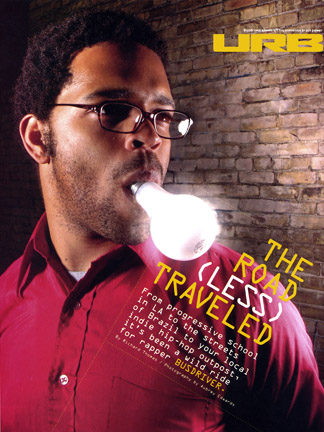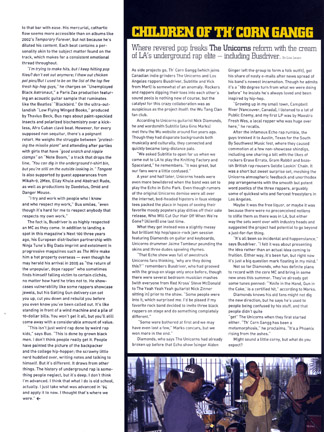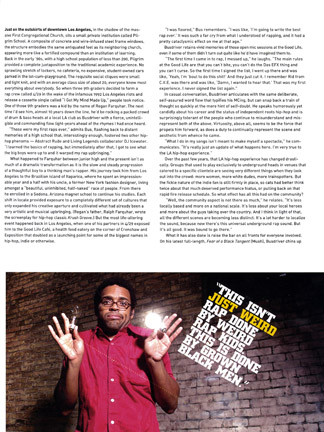
THE ROAD (LESS) TRAVELLED
FROM PROGRESSIVE SCHOOL IN LA TO THE STREETS OF BRAZIL TO YOUR LOCAL INDIE HIP-HOP OUTPOST, IT'S BEEN A WILD RIDE FOR RAPPER BUSDRIVER
Just on the outskirts of downtown Los Angeles, in the shadow of the massive First Congregational Church, sits a small private institution called Pilgrim School. A composite of concrete and wire-infused steel framed windows, the structure embodies the same antiquated feel as its neighboring church, appearing more like a fortified compound than an institution of learning. Back in the early '90s, with a high school population of less than 200, Pilgrim provided a complete juxtaposition to the traditional academic experience. No sprawling stretch of lockers, no cafeteria, no expensive, student-owned cars parked in the lot-cum-playground. The requisite social cliques were small and tight knit, and with an average class size of about 20, everyone knew most everything about everybody. So when three 9th graders decided to form a rap crew called 4/29 in the wake of the infamous 1992 Los Angeles riots and release a cassette single called "I Got My Mind Made Up," people took notice. One of those 9th graders was a kid by the name of Regan Farquhar. The next time I'd see him, almost 10 years down the line, he'd be rocking a packed crowd of drum & bass heads at a local LA club as Busdriver with a fierce, unintelligible and commanding flow light-years ahead of the rhymes I had once heard.
"Those were my first raps ever," admits Bus, flashing back to distant memories of a high school that, interestingly enough, fostered two other hip-hop phenoms - Abstract Rude and Living Legends collaborator DJ Icewater. "I learned the basics of rapping, but immediately after that, I got to see what the big boys were up to and it warped my rap upbringing."
What happened to Farquhar between junior high and the present isn't as much as a dramatic transformation as it is the slow and steady progression of a thoughtful boy to a thinking man's rapper. His journey took him from Los Angeles to the Brazilian island of Itaparica, where he spent an impressionable year and a half with his uncle, a former New York fashion designer, living amongst a "beautiful, uninhibited, half-naked" race of people. From there he enrolled in a Sedona, Arizona magnet school to continue his studies. Each shift in locale provided exposure to a completely different set of cultures that only expanded his creative aperture and cultivated what had already been a very artistic and musical upbringing. [Reagan's father, Ralph Farquhar, wrote the screenplay for hip-hop classic Krush Groove.] But the most life-altering event happened back in Los Angeles, when one of his partners in 4/29 exposed him to the Good Life Café, a health food eatery on the corner of Crenshaw and Exposition that doubled as a launching point for some of the biggest names in hip-hop, indie or otherwise.
"I was floored," Bus remembers. "I was like, 'I'm going to write the best rap ever.' It was such a far cry from what I understood of rapping, and it had a pretty cataclysmic effect on me at that age."
Busdriver retains vivid memories of those open mic sessions at the Good Life, even some of them didn't turn out quite like he'd imagined them to.
"The first time I came in to rap, I messed up," he laughs. "The main rules at the Good Life are that you can't bite, you can't do the Das EFX thing and you can't curse. So for the first time I signed the list, I went up there and was like, 'Yeah, I'm 'bout to do this shit!' And they just cut it. I remember Rid from C.V.E was there and was like, 'Damn, I wanted to hear that.' That was my first experience. I never signed the list again.'
In casual conversation, Busdriver articulates with the same deliberate, self-assured word flow that typifies his MCing, but can snap back a train of thought so quickly at the mere hint of self-doubt. He speaks humorously yet candidly about his career and the status of independent roots hip-hop and is surprisingly tolerant of the people who continue to misunderstand and misrepresent both of the above. Virtuosity, above all, seems to be the force that propels him forward, as does the duty to continually represent the scene and aesthetic from whence he came.
-
"What I do in my songs isn't meant to make myself a spectacle," he communicates. "It's really just an update of what happens here. I'm very true to the LA hip-hop experience."
Over the past few years, that LA hip-hop experience has changed drastically. Groups that used to play exclusively to underground heads in venues that catered to a specific clientele are seeing very different things when they look out into the crowd: more women, more white dudes, more trainspotters. But the fickle nature of the indie fan is still firmly in place, so cats had better think twice about that much deserved performance hiatus, or pulling back on that rapid fire release schedule. So what effect has all this had on the community?
"Well, the community aspect is not there as much," he relates. "It's less locally based and more on a national scale. It's less about your local heroes and more about the guys taking over the country. And I think in light of that, all the different scenes are becoming less distinct. It's a lot harder to localize the sound, because now there's this universal underground rap sound. But it's all good. It was bound to go there."
What it has also done is raise the bar on all fronts for everyone involved. On his latest full-length, Fear of a Black Tangent (Mush), Busdriver chins up to that bar with ease. His mercurial, cathartic flow seems more accessible than on albums like 2002's Temporary Forever, but not because he's diluted his content. Each beat contains a personality akin to the subject matter found on the track, which makes for a consistent emotional thread throughout.

-
"I'm trying to make hits, but I keep hitting pop flies/ I don't eat out anymore; I thaw out chicken pot pies/ But I used to be on the list of top five fresh hip-hop guys," he charges on "Unemployed black Astronaut," a Paris Zax production featuring an acoustic guitar sample that ruminates like the Beatles' "Blackbird." On the ultra-out-landish "Low Flying Winged Books," produced by Thavius Beck, Bus raps about paint-speckled insects and polarized biochemistry over a kickless, Afro Cuban clave beat. However, for every supposed non sequitur, there's a poignant retort. He weighs the struggle between "protesting the missile plant" and attending after parties with girls that have "good snatch and nipple clamps" on "Note Boom," a track that drops the line, "You can dig in the underground t-shirt bin, but you're still on the outside looking in." Tangent is also supported by guest appearances from Mikah-9, 2Mex, Ellay Khule and Abstract Rude, as well as productions by Daedelus, Omid and Danger Mouse.
I try and work with people who I know and who respect my work," Bus smiles, "even though it's hard for me to respect anybody that respects my own work."
The fact is, Busdriver is as highly respected an MC as they come. In addition to landing a spot in this magazine's Next 100 three years ago, his European distribution partnership with Ninja Tunes's Big Dada imprint and extolment in progressive magazines such as The Wire make him a hot property overseas - even though he may herald his arrival in 2005 as "the return of the unpopular, dope rapper" who sometimes finds himself falling victim to certain clichés, no matter how hard he tries not to. He showcases vulnerability like some rappers showcase jewels, but his Gattling Gun delivery can set you up, cut you down and rebuild you before you even know you've been called out. It's like standing in front of a wind machine and a pile of 10-dollar bills. You won't get it all but you'll still come away with a considerable amount of value.
"This isn't just weird rap done by weird rap kids," says Bus. "This is done by grown black men. I don't think people really get it. People have painted the picture of the backpacker and the college hip-hopper; the scrawny little nerd huddled over, writing notes and talking to himself. But it's different. It draws from other things. The history of underground rap is something people neglect, but it's deep. I don't think I'm advanced. I think that what I do is old school, actually. I just take what was advanced in '94 and apply it to now. I thought that's where we were."
- CHILDREN OF TH' CORN GANGG
- WHERE REVERED POP FREAKS THE UNICORNS REFORM WITH THE CREAM OD LA'S UNDERGROUND RAP ELIT - INCLUDING BUSDRIVER
- CHILDREN OF TH' CORN GANGG
As side projects go, Th' Corn Gangg (which joins Canadian indie grinders The Unicorns and Los Angeles rappers Busdriver, Subtitle and Vick from Merl) is somewhat of an anomaly, Rockers and rappers dipping their toes into each other's sound pools is nothing new of course, but the catalyst for this crazy collaboration was as auspicious as the project itself: the Wu Tang Clan fan club.
According to Unicorns guitarist Nick Diamonds, he and wordsmith Subtitle (aka Gino Marks) met thru the Wu website around five years ago. Though they had disparate backgrounds both musically and culturally, they connected and quickly became long-distance pals.
"We asked Subtitle to open for us when we came out to LA to play the Knitting Factory and Spaceland," he remembers. "It was great, but our fans were a little confused."
A year and a half later, Unicorns heads were even more bewildered when the band was set to play the Echo in Echo Park. Even though rumors of the original Unicorns demise were all over the internet, bed-headed hipsters in faux vintage tees packed the place in hopes of seeing their favorite moody popsters play ditties off their sole release, Who Will Cut Our Hair Off When We're Gone? (Alien8) one last time.
What they got instead was a slightly messy but brilliant hip hop/ space-rock jam session featuring Diamonds on guitar and keyboards, Unicorns drummer Jaime Tambeur pounding the skins and three dudes spewing rhymes.
"The Echo show was full of awestruck Unicorns fans thinking, 'why are they doing this?"' remembers Busdriver, who had grooved with the group on stage only once before, though there were several bedroom musician mashes [with everyone from Red Kross' Steve McDonald to The Yeah Yeah Yeah guitarist Nick Zinner sitting in] prior to the show. "Some people were into it, which surprised me. I'd be pissed if my favorite rock band decided to invite three black rappers on stage to do something completely different."
"Some were bothered at first and we may have even lost a few," Marks concurs, but we won more in the end."
Diamonds, who says The unicorns had already broken up before that Echo show (singer Alden Ginger left the group to form a folk outfit), got his share of nasty e-mails after news spread of his band's newest incarnation. Though he admits it's a "180 degree turn from what we were doing before" he insists he's always loved and been inspired by hip-hop.
"Growing up in my small town, Cambell River [Vancouver, Canada], I listened to a lot of Public Enemy, and my first Lp was by Maestro Fresh Wes, a local rapper who was huge over here," he recalls.
After the infamous Echo rap rumble, the guys trekked it to Austin, Texas for the South By Southwest Music fest, where they caused commotion at a few non-showcase shindigs, including one sharing a bill with the likes of rockers Erase Errata, Gram Rabbit and bozoish British rap rousers Goldie Lookin' Chain. It was a short but sweet surprise set, meshing the Unicorns atmospheric feedback and unorthodox pop arrangements with the smooth but potent word poetics of the three rappers, arguably some of the quickest wits and fiercest freestylers in Los Angeles.
Maybe it was the free liquor, or maybe it was because there were no preconceived notions to stifle them as there was in LA, but either way the sets went over with industry heads and suggested the project had potential to go beyond a just-for-fun thing. "It's all been so incidental and happenstance," says Busdriver. "I felt it was about presenting the idea rather than an actual idea coming to fruition. Either way, it's been fun, but right now it's just a big question mark floating in my mind."
Not so for Diamonds, who has definite plans to record with the core MC and bring in some new ones this summer. They've already got some tunes penned: "'Knife in the Hand, Gun in the Cake,' is a certified hit," according to Marks.
Diamonds knows his old fans might not dig the new direction, but he says he's used to people being confused by his stuff, and that people didn't quite "get" The Unicorns when they first started either. "Th' Corn Gangg has been a metamorphosis," he proclaims. "It's a Phoenix rising from the ashes."
Might sound a little corny, but what do you expect
LINA LECARO
